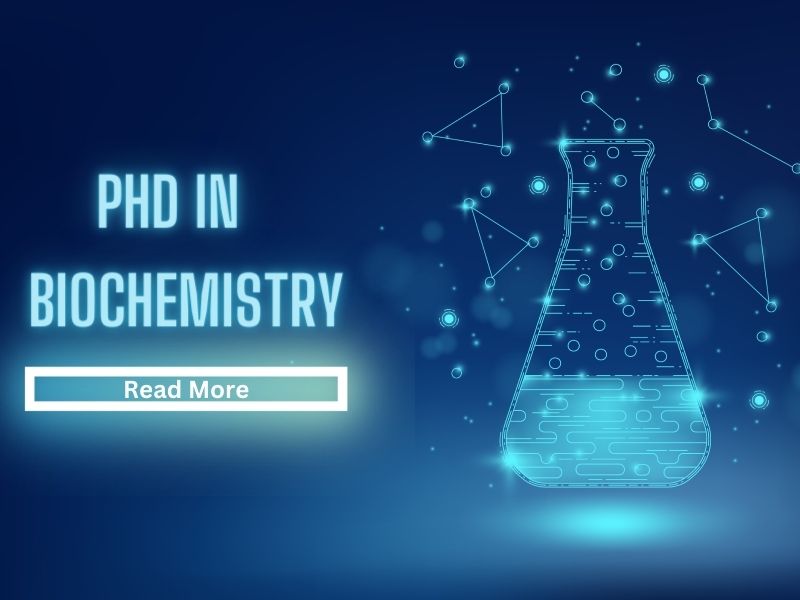Ph.D. in Doctor of Philosophy in Biochemistry: Introduction, Admission, Registration, Eligibility, Duration, Fees, Syllabus 2024

Introduction:
Embarking on a journey towards a Ph.D. in Biochemistry is an invitation to delve deep into the intricate workings of living organisms at the molecular level. This advanced academic pursuit opens doors to cutting-edge research, innovative discoveries, and impactful contributions to scientific knowledge and healthcare. In this blog, we unravel the essence of pursuing a Doctor of Philosophy in Biochemistry, exploring its admission process, eligibility criteria, completion time, career opportunities, syllabus, internship prospects, as well as available scholarships and grants.
Admission Process:
- Research: Identify potential advisors and research interests.
- Application: Submit transcripts, GRE scores, recommendation letters, and a statement of purpose.
- Interviews: Participate in interviews with potential advisors and admission committees.
- Selection: Successful candidates are offered admission based on academic merit, research potential, and fit with the program.
- Acceptance: Upon acceptance, finalize enrollment details and begin preparations for the program.
Eligibility:
- Bachelor's and/or Master's degree in biochemistry, chemistry, biology, or related fields.
- Minimum GPA requirement, often above 3.0 on a 4.0 scale.
- Strong background in biochemistry, molecular biology, and related disciplines.
- Demonstrated research experience through publications, projects, or internships.
- Fulfillment of specific program requirements, such as language proficiency exams or prerequisite courses.
- Letters of recommendation from academic or professional mentors.
- Competitive GRE scores, though some programs may waive this requirement.
Completion Time:
The duration of a Ph.D. in Biochemistry typically ranges from 4 to 6 years, depending on factors such as research progress, publication requirements, and program structure. However, some students may complete their degrees earlier or take longer, depending on individual circumstances and project complexities.
Career Opportunities:
- Research Scientist: Conducting research in academia, government agencies, or private industries.
- Academic Faculty: Teaching and conducting research in universities and colleges.
- Pharmaceutical Industry: Developing drugs, conducting clinical trials, and ensuring product safety and efficacy.
- Biotechnology: Innovating new technologies, products, and processes in areas like genetic engineering and diagnostics.
- Government Agencies: Working in regulatory bodies, public health organizations, or environmental agencies.
- Science Communication: Engaging in science writing, journalism, or outreach to educate the public.
- Entrepreneurship: Establishing startups or consulting firms in biotech, pharmaceuticals, or related fields.
Syllabus:
- Advanced Biochemistry: Protein structure, enzymology, metabolism, and signaling pathways.
- Molecular Biology Techniques: Gene cloning, PCR, DNA sequencing, and recombinant DNA technology.
- Biophysical Chemistry: Principles of spectroscopy, kinetics, and thermodynamics applied to biological systems.
- Cell Biology: Cellular structure, organelle function, and cellular processes such as mitosis and apoptosis.
- Bioinformatics: Computational tools for analyzing biological data, genome sequencing, and protein structure prediction.
- Advanced Topics: Specialized seminars or courses on current research trends and methodologies.
- Dissertation Research: Independent research under the guidance of a faculty advisor.
Internship Opportunities:
- Industry Placements: Internships in pharmaceutical companies, biotech firms, or research institutions.
- Government Agencies: Internships with agencies such as the NIH, FDA, or CDC.
- Academic Collaborations: Collaborative projects with other universities or research centers.
- Non-profit Organizations: Internships with organizations focused on health, environment, or scientific education.
- International Opportunities: Research internships abroad to gain diverse perspectives and experiences.
Scholarships and Grants:
- National Institutes of Health (NIH) Fellowships: Predoctoral fellowships supporting research in biomedical sciences.
- National Science Foundation (NSF) Grants: Funding for graduate research in various scientific disciplines.
- Departmental Scholarships: Financial assistance provided by individual departments or universities.
- Private Foundations: Scholarships offered by organizations such as the American Chemical Society or Howard Hughes Medical Institute.
- Research Assistantships: Assistantship positions that include stipends and tuition waivers in exchange for research or teaching dutie
FAQs:
Can I pursue a Ph.D. in Biochemistry without a master's degree?
While some programs accept students with a bachelor's degree, a master's degree is usually preferred for advanced research training.
Are there opportunities for interdisciplinary research in biochemistry?
Yes, many programs encourage collaboration across disciplines such as chemistry, biology, engineering, and medicine.
How can I find potential advisors for my Ph.D. research?
Explore faculty profiles on university websites, attend conferences, and reach out to current graduate students for recommendations.
Is it possible to work while pursuing a Ph.D. in Biochemistry?
Balancing work and research can be challenging, but some students opt for part-time employment or research assistantships.
What skills are essential for success in a Ph.D. program?
Strong analytical skills, critical thinking, creativity, perseverance, and effective communication are indispensable for navigating the challenges of doctoral research.





